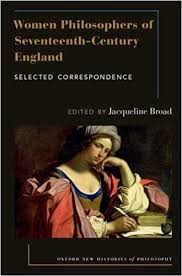David Cunning at Notre Dame Philosophical Reviews:
 The selected correspondence between Masham and Locke is fascinating to say the least. One of the exchanges treats the topic of religious enthusiasm. In response to Locke’s dismissal of religious enthusiasm as having no epistemological value, Masham notes that Locke might be thinking too narrowly of enthusiasm and indeed that there appears to be a version of it that readies the mind for reflection — a “Divine Sagacitie which is onely Competible to Persons of Pure and Unspoted Minds and without which Reason is not successful in the Contemplation of the Highest matters” (133-34). In another exchange, Masham presses Locke on how an empiricist can account for the formation of an idea of eternity in a finite human mind. Masham argues that the content of that idea does not represent eternity, but merely finite time repeated; that wouldn’t be an idea of eternity at all (184). Here she is gesturing at her own (Cambridge) Platonism and hinting that there are other entities about which Locke thinks we can reason — for example God — but where Lockean empiricism does not allow us to have ideas of them. Masham argues that at the very least finite minds are pre-formed with dispositions and traces, without which many of our ideas would never take shape (183). A third topic that is prominent in the exchanges between Masham and Locke is the question of whether or not the ethical doctrine of Stoicism can be lived by embodied human beings. For example, Masham says that if Epictetus and others are correct, then “Reason Teaches me . . . to be Contended with the World as it tis, and to make the Best of everything in it” (159).
The selected correspondence between Masham and Locke is fascinating to say the least. One of the exchanges treats the topic of religious enthusiasm. In response to Locke’s dismissal of religious enthusiasm as having no epistemological value, Masham notes that Locke might be thinking too narrowly of enthusiasm and indeed that there appears to be a version of it that readies the mind for reflection — a “Divine Sagacitie which is onely Competible to Persons of Pure and Unspoted Minds and without which Reason is not successful in the Contemplation of the Highest matters” (133-34). In another exchange, Masham presses Locke on how an empiricist can account for the formation of an idea of eternity in a finite human mind. Masham argues that the content of that idea does not represent eternity, but merely finite time repeated; that wouldn’t be an idea of eternity at all (184). Here she is gesturing at her own (Cambridge) Platonism and hinting that there are other entities about which Locke thinks we can reason — for example God — but where Lockean empiricism does not allow us to have ideas of them. Masham argues that at the very least finite minds are pre-formed with dispositions and traces, without which many of our ideas would never take shape (183). A third topic that is prominent in the exchanges between Masham and Locke is the question of whether or not the ethical doctrine of Stoicism can be lived by embodied human beings. For example, Masham says that if Epictetus and others are correct, then “Reason Teaches me . . . to be Contended with the World as it tis, and to make the Best of everything in it” (159).
more here.
